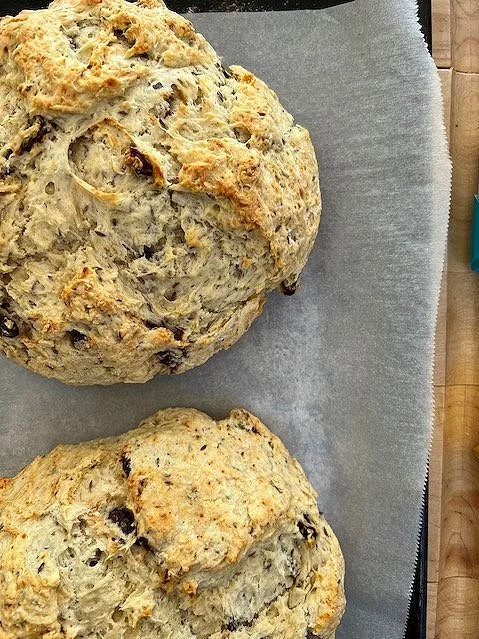Karen Collins’ Irish Soda Bread
March 9, 2022
I received the loveliest email this week from Karen Collins, expert baker and owner of Bisousweet Confections. She was offering her well-tested Irish Soda Bread recipe to share with our readers just in time for St. Patrick’s Day and I was thrilled when I read it.
My own go-to soda bread recipe, the one I make every year to pair with a spring lamb stew or braised bacon and cabbage, has always been Darina Allen’s, from her fabulous Forgotten Skills of Cooking. Her Ballymaloe classic is a simple blend of flour, salt, bicarb and buttermilk—no richness from butter nor sweetness from sugar. It’s a dense, plain, one-bowl recipe and would never be confused with a scone. This is bread, not cake; very Irish, very sturdy, very sliceable.
If I want something to serve at teatime or breakfast, though, to be slathered with yellow Irish butter and dribbled with local honey, Darina’s Spotted Dog fits the bill. She adds a bit of sugar, an egg and a handful of sultanas (raisins) to the original recipe, and while it’s still not rich like a scone it’s got a lovely flavor, especially if one adds the suggested caraway seeds, which makes it—Darina says—more of an American soda bread than a true Irish one. I adore the anise-y bite of caraway so I add them every time.
The recipe that Karen sent was a totally different beast. Early in her career, she’d tinkered with a method found in Kathleen King’s Kathleen’s Bakeshop Cookbook while baking for St. Patrick’s Day and what she created is a revelation: a delicate crumb, rich with butter and buttermilk and studded generously with rum-soaked raisins. It’s not too sweet, and the recipe yields two hearty rounds so you can enjoy one warm from the oven and the second at room temperature, when the flavors have developed and the crust slightly softened.
Karen’s recipe is also caraway-optional, but I added them and I suggest you do the same. And while it may not be traditional, I’ll be soaking my soda bread raisins in extra dark Goslings from now on; it does require a bit of overnight prep, but even a few hours under the rum can do the trick. I think Darina would approve.
Makes 2 loaves
4 cups all-purpose flour
2 tablespoons granulated sugar
1 tablespoon baking powder
1 teaspoon baking soda
1 teaspoon salt
1 stick (½ cup) unsalted butter, room temperature, cut into small cubes
1 cup raisins
¼ cup dark rum (optional)
3 tablespoons caraway seeds (optional)
2 cups buttermilk
Prepare rum raisins. This step can be done right before baking, or a day or two ahead of time. Measure raisins into heat proof bowl. Pour hot/boiling water over raisins and let sit for 10 minutes. Drain well, transfer to a small bowl and pour rum over. Allow to macerate for at least a few hours or overnight (for best results).
Preheat oven to 350° F. Line a baking tray with parchment paper; set aside.
Measure flour, sugar, baking powder, baking soda and salt into a large bowl. Whisk together to blend. Add butter cubes to the dry mixture and using your fingers, a fork or a pastry cutter, cut butter into the dry ingredients until mixture looks shaggy, or like coarse meal.
Drain rum raisins, then add raisins to mixture. If using caraway seeds, add them now. Toss lightly to blend.
Add buttermilk all at once and stir mixture with a wooden spoon until all the dry ingredients are moistened. The dough will be sticky and soft… Don’t be alarmed.
Dust counter with flour. Scrape dough onto counter and gently knead dough until smooth. Divide dough into two equal portions and shape into balls. Do not overwork.
Place balls on a baking tray lined with parchment leaving at least 2 inches between them. Using a sharp knife, cut an X ¼” deep on the top of each loaf.
Bake for 40–45 minutes or until crusty and golden. Serve warm or at room temperature, slathered with plenty of Kerrygold salted butter or other richly golden pastured cultured butter.
(Note: If you don’t have buttermilk on hand, you can make it at home. To make 2 cups of buttermilk, measure 2 tablespoons of lemon juice or white vinegar into a 2- or 4-cup liquid measuring cup. Pour milk over lemon juice or vinegar until there is 2 cups of liquid. Stir to blend and allow to sit until thickened before using, around 5 minutes.)




